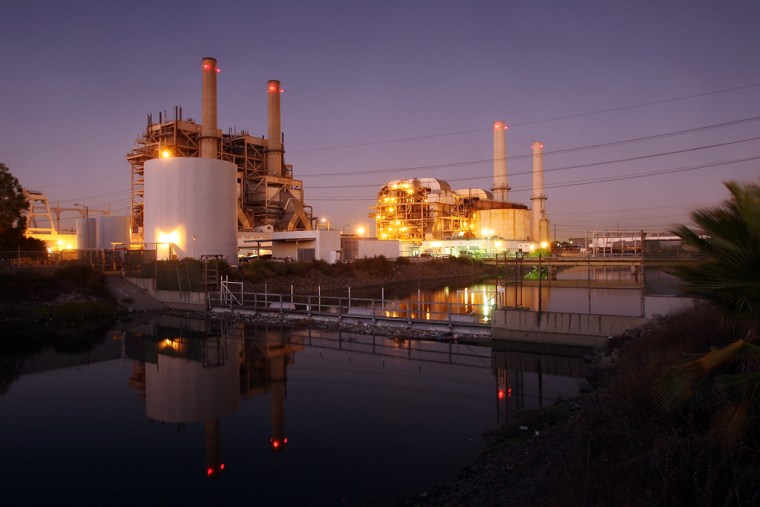The Environmental Protection Agency took a major step Monday toward regulating greenhouses gases, concluding that climate changing pollution threatens the public health and the environment.
The announcement came as the Obama administration looked to boost its arguments at an international climate conference that the United States is aggressively taking actions to combat global warming, even though Congress has yet to act on climate legislation. The conference opened Monday in Copenhagen.
The EPA said that the scientific evidence surrounding climate change clearly shows that greenhouse gases "threaten the public health and welfare of the American people" and that the pollutants — mainly carbon dioxide from burning fossil fuels — should be regulated under the Clean Air Act.
"These long-overdue findings cement 2009's place in history as the year when the United States government began addressing the challenge of greenhouse-gas pollution," said EPA Administrator Lisa Jackson at news conference.
The action by the EPA, which has been anticipated for months, clearly was timed to add to the momentum toward some sort of agreement on climate change at the Copenhagen conference and try to push Congress to approve climate legislation.
"This is a clear message to Copenhagen of the Obama administration's commitments to address global climate change," said Sen. John Kerry, D-Mass., lead author of a climate bill before the Senate. "The message to Congress is crystal clear: get moving."
Obama planned to talk with former Vice President Al Gore at the White House on Monday as the president prepares for his appearance on Dec. 18 at the climate summit in Copenhagen. Gore won the Nobel Peace Prize in 2007 for his work toward combating climate change.
Obama is also meeting on Wednesday with environmental leaders and U.S. business leaders to discuss climate change.
Under a Supreme Court ruling, the finding of endangerment is needed before the EPA can regulate carbon dioxide and five other greenhouse gases released from power plants, factories and automobiles under the federal Clean Air Act.
Slideshow 10 photos
Coal dependence darkens Poland’s skies
The EPA signaled last April that it was inclined to view heat-trapping pollution as a threat to public health and welfare and began to take public comments under a formal rulemaking. The action marked a reversal from the Bush administration, which had declined to aggressively pursue the issue.
Business groups have strongly argued against tackling global warming through the Clean Air Act, saying it is less flexible and more costly than the cap-and-trade bill being considered before Congress. On Monday, some of those groups questioned the timing of the EPA's announcement, calling it political.
"The implications of today's action by EPA are far-reaching ... individual Americans and consumers and businesses alike will be dramatically affected by this decision," said Charles T. Drevna, the president of the National Petrochemical & Refiners Association. Drevna, in a statement, said "it is hardly the time to risk the remainder of the U.S. industrial sector in an attempt to achieve a short-term international public relations victory."
Waiting for Congress to act
Any regulations are also likely to spawn lawsuits and lengthy legal fights.
The EPA and the White House have said regulations on greenhouse gases will not be imminent even after an endangerment finding, saying that the administration would prefer that Congress act to limit such pollution through an economy-wide cap on carbon dioxide and other greenhouse gases.
Nevertheless, the EPA has begun the early stages of developing permit requirements on carbon dioxide pollution from large emitters such as power plants. The administration also has said it will require automobile fuel economy to increase to a fleet average of 35 miles per gallon by 2016, another push to reduce carbon dioxide emissions.
The EPA's readiness to tackle climate change is expected to give a boost to U.S. arguments at the climate conference opening in Copenhagen this week that the United States is making broad commitments to reduce greenhouse gases.
While the House has approved climate legislation that would cut emissions by 17 percent by 2020 and about 80 percent by mid-century, the Senate has yet to take up the measure amid strong Republican opposition and reluctance by some centrist Democrats.
Sen. John Kerry, D-Mass., lead author of the Senate bill, has argued that if Congress doesn't act, the EPA will require greenhouse gas emissions. He has called EPA regulation a "blunt instrument" that would pose a bigger problem for industry than legislation crafted to mitigate some of the costs of shifting away from carbon emitting fossil fuels.
The way was opened for the EPA to use the Clean Air Act to cut climate-changing emissions by the Supreme Court in 2007, when the court declared that carbon dioxide and other greenhouse gases are pollutants under the Act. But the court said the EPA must determine if these pollutants pose a danger to public health and welfare before it can regulate them.

